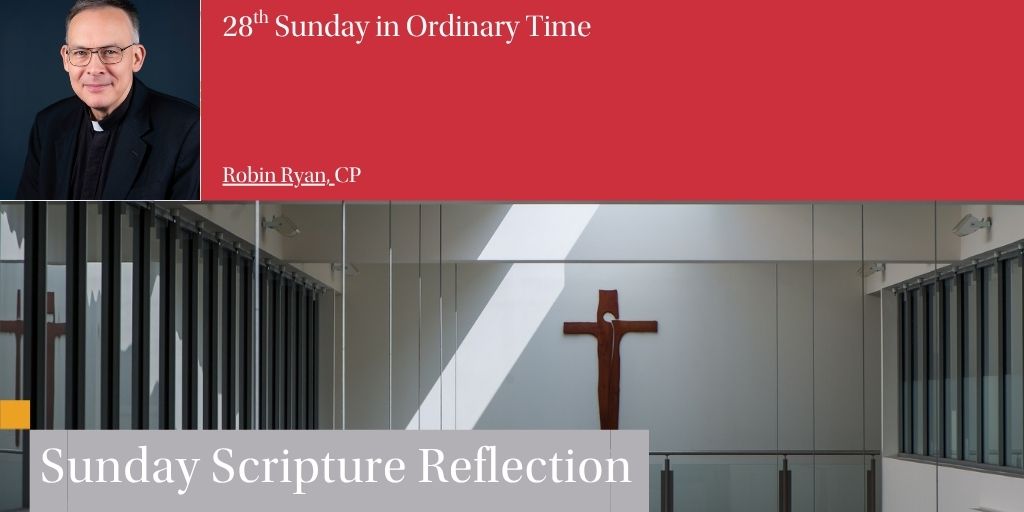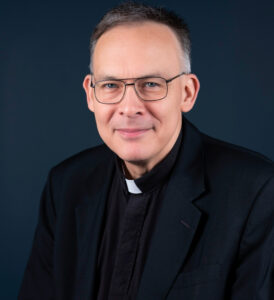

Readings:
2 Kings 5:14-17
Psalm 98:1, 2-3, 3-4
2 Timothy 2:8-13
Luke 17:11-19
I suspect that all of us know from personal experience how powerful a word can be. A word can offer life or take life away. It can heal or inflict a terrible wound. A word can give someone hope or drive them to despair. In our politically polarized society, we are so often bombarded by words that deceive and demean.
The power of a word is very evident in the Scripture readings for this Sunday’s liturgy. The leper, Naaman, an Aramean army commander, is given an authoritative word by the prophet Elisha, who tells him to plunge into the Jordan River. He eventually obeys that word, even though initially he was hoping that the prophet would find a more spectacular way to cure his leprosy. By heeding the prophetic word, Naaman experiences healing and a whole new life. His healing is completed when he acknowledges this gift from God and returns to offer a gift to the prophet.
Paul the Apostle is seized by the word of God, which he says cannot be chained. This word is the Gospel, the Good News of Jesus Christ. He has proclaimed that word faithfully, even though it has meant great hardship for him, even imprisonment. And he has experienced firsthand the truth of the words contained in his letter to Timothy: even if we are unfaithful, Christ remains faithful, for he cannot deny himself.
The word that Jesus speaks to the ten lepers featured in the Gospel Passage brings new life to people who were suffering from the effects of that dreaded disease. All ten had enough faith to heed Jesus’ word to go and show themselves to the priests. They were cleansed. But only one returned to praise God and to thank Jesus. And he was a Samaritan, an outsider. In and through his expression of gratitude, he experienced salvation in the full sense of the word.
One of my former responsibilities for the Passionist community was service as a liaison to our Passionst Volunteers International program. Each year a group of young adults spent a year or more of service in our mission in Mandeville, Jamaica. They worked with young people and with the very poor. One of the places they regularly visited was the Manchester Infirmary. It is a county infirmary for people who have no family, no money, and nowhere else to go. The infirmary is a grim place, with rows of cots spaced closely together and no distinctive units for residents who suffer from a wide variety of conditions.
On one visit to Jamaica, I went to the infirmary with one of the volunteers who regularly visited there. This volunteer was a very tall young woman with a delightful, very extraverted personality. When she walked into the infirmary, that grim place came alive. She knew the names of all of the residents, and it was evident that they were happy to see her. She told me that she wanted me to meet a woman who had been an inspiration to her, named Miss Morgan. Miss Morgan is an amputee and at the time she did not have a wheelchair. So she spent most of the day sitting on her bed. I noticed that on her bed was a copy of one of those small New Testaments with the tiny print. It was marked up with yellow and green highlighting. The volunteer introduced me to Ms. Morgan and I just said, “How are you today?” She looked at me and said, “Well you know, Father Ryan, you have to give thanks; you have to give thanks.” Then she told me about some of the things for which she was grateful, especially the visits of the volunteer.
As we drove away from the infirmary that day, I could not get her words out of my mind: “Well, you know, Father Ryan, you have to give thanks.” I strongly suspect that if I were a resident of the Manchester Infirmary and someone asked me how I was, my first words would not be, “You have to give thanks.” But those were her words.
Pope Francis often reminded us that our fundamental stance as baptized Christians is meant to be one of gratitude. We are called to be grateful to God for God’s saving love poured out in Jesus Christ. God’s love gives life and restores life when it is drained away from us, as it did for the ten lepers. Miss Morgan seemed to know that instinctively.
The word eucharist means, literally, “thanksgiving.” Every time we celebrate the Eucharist we are like the Samaritan leper in the Gospel, returning to give thanks. May the Eucharist inspire us to speak our own words of gratitude to God and to one another.
Robin Ryan, CP